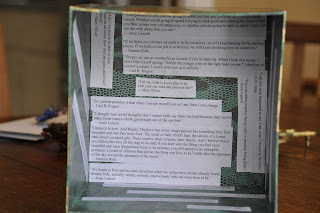There are times of crisis where we need additional care. Where we are the ones who can love and nurture ourselves through hardships. Yet in the midst of a raging storm, it’s hard to remember the resources we have. In an attempt to address just this problem, I suggest assembling a Kit of Things That Work (When Nothing Else Does). Cary Tennis first made this suggestion in his advice column on Salon.com and I have used it ever since.
During times of relative peace we can add to tool kits so that we may better attend to ourselves when times are tough. We do this when we practice healthy choices and create routines that nurture us. We do this not only because it helps in the here and now, but also as a way of training for difficult times. When we have set up practices that nurture our souls, create lives that are rich and true to who we are, when difficulties arise (which they are 100% certain to) we have a solid foundation to flail on.
This intervention is a literal interpretation of the metaphorical tool kit we assemble during therapy. The visualizations, the deep breathing, the corrective thoughts, the affirmations, whatever tricks you’ve learned to help yourself through difficult times. The two kits go hand in hand, but it helps at times to have physical objects to center and ground you. To remind you that you are a physical being present on this earth-- and not, much my surprise, a walking head or an accumulation of neuroses.
So we begin by getting a nice medium sized box. It shouldn’t distress you when you look at it. It should be nice enough that when you’re walking through your house you don’t feel the urge to toss it out with the garbage. Not just because you do not want to lose this valuable kit and all that’s held within, but also because you deserve to have beautiful things around you. Your mental health deserves much more than junk for a home. You may want to decorate the box. To shower it with touches of what makes you happy or feel most yourself.
I decorated my box with uplifting quotes from my favorite authors. Words speak to me in powerful ways. You may find that colors, collages, pictures, or something else entirely works better for you. The point is to make the box appealing to you. Something that you’d like to open, because it contains things that you love.
Then start putting things into the box that you might need in times of crisis. Think of the things that sooth you. What loosens the grip of anxiety within you? What smells, sights, textures make you melt? Is there a picture or a poem that has the power to change your mood, even for a moment? There’s no right object or set of objects to put in the box. What will make it right is that it works for you.
Here’s a list of what I included in my box, just to give you some ideas.
·
God’s Inbox Essay by Anne Lamott (I read it
whenever I’m feeling anxious, it helps more than words can say).
·
A letter of recommendation from my old pastor.
·
Silly putty
·
A rose-shaped pine cone
·
A blue butterfly
·
A picture of me at 3 years old
·
A picture from my trip to Italy
·
A picture of me with my feet in the Mediterranean
·
Two vanilla scented votive candles
·
Dried flowers
·
Tissues (to give myself permission to cry)
Then write a letter from yourself today to you in crisis. Write it as if you are tending to an old friend who’s going through a very rough period. You know yourself better than anyone else, what could motivate you to keep going? What could encourage you to invest in life fully and openly? What words might make you feel safe enough to sink into whatever you’re feeling and know that it cannot destroy you? Put that in the letter. Don’t worry if the words don’t come perfectly; know that the effort to comfort yourself is enough, and is a sign of the love you lavish on yourself.
I like the idea of labeling the box. You can call it whatever you like. “Kit of Things That Work”, “My Mental Health Tool Box”, “Crisis Box”, “My Breakdown Kit” anything that you like. This way when you’re really losing it, and you think you’re gone for good this time, and you don’t even remember what the box is for, you can read those words and at least get a hint of where to start.


